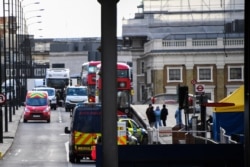The head of Britain’s domestic spy agency outlined Wednesday a cauldron of threats the country is facing, including from Islamist militancy to rising right-wing extremism, but he emphasized the biggest long-term challenge is presented by China.
Russia currently poses the biggest state-based threat to Britain, but China will become more dangerous in the future, Ken McCallum told reporters in London in his first public remarks as the new head of MI5. He said Russia was delivering “bursts of bad weather,” while Beijing is “changing the climate.”
The 45-year-old Glasgow-born spy chief said he’s planning to expand his agency’s operations to counter clandestine Chinese activities. He warned that Beijing has been seeking to steal the intellectual property of British businesses, including pharmaceutical companies, and universities.
“The UK wants to cooperate with China on the big global issues like climate change, while at the same time being robust in confronting covert hostile activity when we come across it,” he said.
McCallum accused hostile states like China and Russia, of no longer just being focused on the traditional espionage activity of stealing government secrets, but also of targeting Britain’s economy and infrastructure, and seeking to undermine its democracy.
He highlighted in his briefing to reporters worrying foreign intelligence activity around Britain’s research and development of vaccines for the coronavirus, saying his agency was trying to block efforts to steal or sabotage vaccine research data. “Clearly, the global prize of having a first useable vaccine against this deadly virus is a large one,’ he said.
“I guess there are two bits we are on the lookout for: attempts either to steal unique intellectual property that’s been generated in that research or potentially to fiddle with the data,” he said. “And then the second risk we’ve got to be alive to is the possibility that the research is still high integrity and sound, but that somebody tries to sow doubt about its integrity,” he added.
Three months ago, Britain’s National Cyber Security Center said Russian-sponsored hackers had been trying to steal vaccine research from universities and pharmaceutical firms.
“In the 2020s, one of the toughest challenges facing MI5 and indeed government is that the differing national security challenges presented by Russian, Chinese, Iranian and other actors are growing in severity and in complexity — while terrorist threats persist at scale,” he said.
“We also do see interference in politics: the influencing of conversations around the European Union for example. We not long ago disrupted a piece of Chinese espionage activity that looked as if it was aimed against the European Union,” he added.
McCallum, who was an undercover agent for 24 years for the agency before taking the top job at MI5, is calling for a register to be set up of foreign agents that would require lobbyists, trade advisers, lawyers and others paid by foreign powers to list their activities. Such registers currently exist in the U.S. and Australia. That would help to fight underhand “interference and influence, which is distinct from the espionage risk,” he said.
In a report published last July, the cross-party intelligence and security committee of the British parliament report warned “Russian influence in the UK is the new normal.” The committee criticized British “enablers and fixers,” including members of Britain’s House of Lords, who have facilitated the flow of Russian money into Britain over the past decade and enriched themselves while turning London into a “laundromat” for Russian cash.
“The arrival of Russian money resulted in a growth industry of enablers – individuals and organizations who manage and lobby for the Russian elite in the UK. Lawyers, accountants, estate agents and PR professionals have played a role, wittingly or unwittingly, in the extension of Russian influence which is often linked to promoting the nefarious interests of the Russian State,” the committee members said in their report.
The British government is currently drafting a new National Security and Investment Bill that would allow business deals and takeovers involving defense and critical infrastructure businesses to be blocked by authorities, if they fear there’s a risk to key British assets.
Turning to terrorism, McCallum said there was a growing threat from right-wing extremism. Since 2017, MI5 had disrupted 27 planned terrorist attacks, eight of them being organized by far-right extremists. “This threat is not, today, on the same scale as Islamist extremist terrorism. But it is growing,” he warned.
He said the coronavirus pandemic had made it more difficult to maintain physical surveillance on suspected terrorists, noting that with fewer pedestrians on the streets, “watchers” were easier to spot by the people they are tailing. But one benefit of the pandemic, he added, is there are fewer events and fewer crowded places for assailants to target.
McCallum, the youngest ever MI5 director general, took over in April. He said he gets deeply concerned when he gets a late-night phone call, fearing it could be to tell him of a terrorist attack.
“When attacks do take place, the human realities are awful. I often say to new joiners at MI5 that the hardest thing about working here is that no matter how much hard work and ingenuity we bring, it isn’t possible for us to stop every attack. Terrorist attacks are always, without exception, sickening. Whenever my phone rings late in the evening, my stomach lurches in case it is one of those awful moments.”







